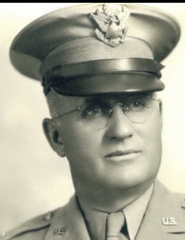Hauling In a Nazi 'Big Shot' All In Day's Work for Iowan
By Frank Miles
(Iowa Daily Times Herald War Correspondent)
In Germany (IDPA) -- Pfc. Lawrence "Swede" Aakre, Cedar Rapids, was among the tallest and T/4 Robert S. Boland, Waterloo and formerly of Council Bluffs, was one of the shortest American soldiers I met in Leipzig.
Private Aakre was escorting a distinguished looking, uniformed individual, bound for a corps headquarters. Major General Wilhelm von Grolman, president of the Leipzig police until a few hours before, was the one in tow. He was an aide to General Ludendorff from 1919 to 1925 and a former brigade fuchrer. The big Iowan was doing his job as if it were all in a days work.
Boland was with an infantry company headquarters company moving toward the retreating Jerries, who then were on the other side of town. He and Aarke were glad to see someone from the home state.
The next day the writer and other scribes inadvertently got beyond the farthest American outpost of Leipzig. Nearby GI road blockers were keenly on the alert for anything. German civilians were permitted to pass on business between certain hours. None was allowed to halt and if two stopped to talk for even a minute the American broke it up.
In Leipzig I saw a JU-88 plant on the fair grounds which American bombers had blasted. Significantly the buildings were of thick concrete with reinforced steel roofs. They had been erected in 1921-22 when Germany was rocked with inflation and her people were crying for help from the outside. American MPS reached the site only an hour before we did. That morning liberated slave workers had stormed the plants food store. A fight ensued.
Major John H. Logan, Ottumwa, of the third cavalry liaison detachment, was among the officers and men billeted a few days in Weimar at the home of Lieutenant Herr Ernst Klutmann, retired, who was in command of the nazi forces in Poland in 1941. The old jerry was allowed to live in the attic while the Americans were there. His attitude was cold but not offensive.
Soon after Americans took Leipzig, soldiers were detailed as Leipzig police and wore LP painted in white on their helmets. Cpl. Carl Wood, of Kirksville, Mo., husband of the former Farrell Long, of Fort Madison, was one of them. Pvt. Lawrence Bowen, Audubon, was another LP.
Near us was a group of German soldiers, who had been captured that day. While we were talking there was heavy rifle fire on a street a block away.
"They may have run into snipers up there," Bowen grinned.
German civilians were allowed on the streets only until 7 o'clock in the evening. They were not permitted to congregate in groups of more than three. Despite the order and the vigilance of the guards they would gather around a parked jeep occupied by Americans and stare strangely. Occasionally one would try to start a conversation, usually by saying he or she had relatives in America. Kids were curious and often made themselves pests but they were handled with firm nature.
Displaced persons -- liberated force laborers from conquered countries -- were in throngs but were not allowed to congregate. Most of the French would hold up their fingers in the victory sign.
Two young Russians wanted to shake hands with every American they saw. Three GIs did an impressive job of keeping a mob of German civilians from raiding a German store. The Germans ran like scared rabbits when the sergeant fired a pistol shot over their heads.
Source: Carroll Daily Times Herald, May 26, 1945
![]()

